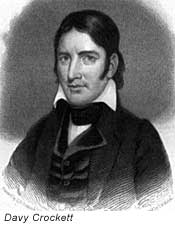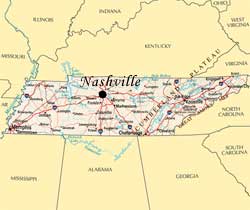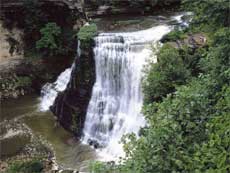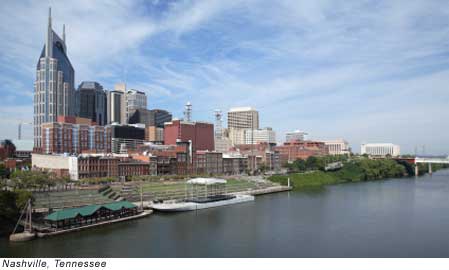 
Tennessee is also known for the people who have lived there. Davy Crockett, the "coonskin cap" congressman, is a famous frontier hero who was born and lived in the state. Visit the Hermitage, the mansion where President Andrew Jackson lived and is now buried. Former Tennessee congressman James Polk was another President of the United States who lived in the state. The United States had its greatest territorial expansion when he was in office. Andrew Johnson, a former state governor, became President after the assassination of Abraham Lincoln.
Tennessee was named after the Tennessee River. The river was named for the Indian word "Tanasie," the name of a Cherokee village. The state is called the "Volunteer State" because so many of its brave men volunteered to fight in the War of 1812 and the Mexican War. The Tennessee River flows through the state twice because of its bend. Because of this, the state has also been called the "Big Bend State." The abbreviation for Tennessee is TN.

 Tennessee is an East South Central state bordered by Kentucky to the north, North Carolina to the east, Mississippi and Alabama to the south, and Missouri and Arkansas to the west. The state, which lies between the Mississippi River on the west and the Appalachian Mountains on the east, touches a total of eight other states. Almost two-fifths of Tennessee's population lives in the state's countryside. Tennessee is an East South Central state bordered by Kentucky to the north, North Carolina to the east, Mississippi and Alabama to the south, and Missouri and Arkansas to the west. The state, which lies between the Mississippi River on the west and the Appalachian Mountains on the east, touches a total of eight other states. Almost two-fifths of Tennessee's population lives in the state's countryside.
Tennessee's state flag, with its three stars, represents the state's three distinct regions that are often thought of as three separate states. See the Great Smoky Mountains in East Tennessee. The area is high and densely wooded. East Tennessee was, for the most part, isolated from the outside world until the 20th Century because of its rugged terrain. Today, East Tennessee has become the most industrialized part of the state. Chattanooga and Knoxville are two important cities in the region.
Middle Tennessee is made up of farmlands of hills and plateaus. The region has good transportation to and from other areas and has developed a more varied economy. Nashville, the state's capital, is an important city in Middle Tennessee.
 The western edge of West Tennessee is part of the Mississippi Floodplain, a region where rich soil is deposited when the river floods. The Mississippi River connects it with other areas. Memphis is an important city in West Tennessee. It has the largest population of any city in the state and is known as the capital of the Mississippi Delta region. The western edge of West Tennessee is part of the Mississippi Floodplain, a region where rich soil is deposited when the river floods. The Mississippi River connects it with other areas. Memphis is an important city in West Tennessee. It has the largest population of any city in the state and is known as the capital of the Mississippi Delta region.
Although considered a Southern state, Tennessee is on the border between the North and the South. West and Middle Tennessee resemble the Deep South, while East Tennessee resembles the North. Because of this, the state experienced divided loyalties during the Civil War. Tennessee was the last of the states to abandon the Union, but the first to return to it. Ironically, Tennessee was the battleground for much of the Civil War. Only Virginia had more battles fought on its soil than Tennessee did.

In the past, Tennessee's economy was largely agricultural-based. Today, however, manufacturing is more important to the state's economy. The Tennessee Valley Authority (TVA), headquartered in Knoxville, built hydroelectric and flood-control dams in the state. The waterpower harnessed by the TVA dams provided cheap electricity, which attracted many new businesses to the area. Because of this, the state is now more industrial than agricultural. Most of the state's residents work in offices, stores, and factories. Service industries, like wholesale and retail trade, play a very important role in its economy. Scientists conduct nuclear research at the Oak Ridge National Laboratory in Tennessee.

There are many sites to visit in Tennessee. Go to Nashville, known as the "Athens of the South," and visit the spectacular reproduction of the Parthenon, an ancient Greek temple. While you're in Nashville, stop and hear "The Grand Ole Opry," a famous live country music radio show. Or go to Memphis and tour Graceland, the luxurious home of Elvis Presley, the "King of Rock and Roll." Memphis is also where Martin Luther King, Jr., who won the Nobel Peace Prize, was assassinated by James Earl Ray.
Visit Dayton, Tennessee, the site of the Scopes trial. The trial, one of the most famous in American history, was one in which a high school teacher named John Thomas Scopes was found guilty of breaking a state law that made it illegal to teach evolution in public schools. The decision was later reversed, however, because of a minor legal error.

|

![]()
